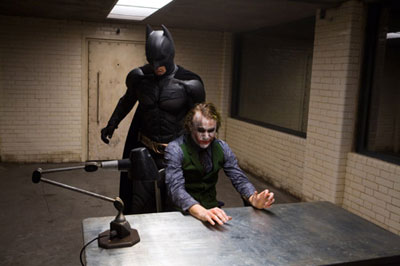DID THE BUSH ADMINSTRATION BANKROLL THE DARK KNIGHT?

Up next: Waterboarding
In The Dark Knight, Batman seeks to protect the world from terrorists and suicide bombers.
But evildoers like the Joker don't play by the rules. So Batman, who has always operated outside of the law, must become even more vigilante and take measures with which even his own staff is uncomfortable.
And so Batman wiretaps all of Gotham's citizens' cell phones. He listens to their conversations to infiltrate terrorist cells. When the Joker is in custody, he resorts to violent interrogation techniques that rise to the level of torture. Not only does he refuse to listen to authorities, he doesn't even stay for the end of conversations. Batman is The Decider.
As Bruce Wayne, Batman also embeds himself in the shady worlds of cronyism and money laundering. His company secretly funds defense contractors and top secret weapons research. He calls upon his rich friends to support men like Harvey Dent who take tough stances on crime. The fundraising is especially important to offset the influence of the Chinese, who are literally sitting on top of our money.
As the film progresses, Batman's approval rating with the citizens of Gotham City begins to tank, in light of the rising death toll of Gotham's soldiers. But the film makes clear to the viewer that Batman was only acting for the greater good.
Which leads to the question that serves as the title of this post: Did the Bush Administration bankroll The Dark Knight?
The movie is well-crafted and undoubtedly entertaining. (To my surprise, Heath Ledger really does give an Oscar-worthy performance.)
But TDK is also a powerful propaganda film that ultimately justifies Bush's actions in his global War on Terror.
Intentional or not, the Nolan brothers clearly support the use of torture and other unlawful custodial interrogation techniques in times of terror. The film climaxes with multiple "ticking time bombs," which is the exact scenario that GOP Congressional leaders and other pundits have cited when defending the need to torture. The sadistic criminal refusing to leak life-saving information is both at the apex of TDK and at the core of why this country hasn't passed more laws banning the use of torture.
Plus, if Congress had any trouble passing the FISA bill, they could have delayed the vote until after this film, which showcases the need for eavesdropping and glorifies other temporary deprivations of civil liberties to fight the bad guys.
As if the allusions to the current administration's policies were not obvious enough, by the end of the film, Harvey Dent even looks like Dick Cheney blew the left side of his face off.
A movie that reflects our post-9/11 world? Nothing new.
But a post-9/11 film that actually seems to unabashedly endorse Bush's post-9/11 response? New to me.
Perhaps the only point that the analogy fails is when we see Batman actually struggle with the moral complexities and ethical constraints of what he's doing.
*
P.S. Since Nolan's version of Batman learned about war in Southeast Asia, perhaps John McCain is a better substitute for The Dark Knight.
(With thanks to Jingalls and Sarisa)
Labels: film, George W. Bush, movies

<< Home